Bob Barker's 15th Visit with Animal Radio
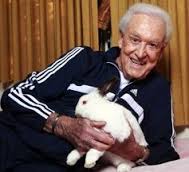 Iconic TV Host and Animal Advocate Bob Barker is back on Animal Radio making his 15th appearance. No other guest even comes close to his record. But if they do, Bob will be back to make sure he keeps it! At 93 years old, Bob is still helping animals live better lives. He's been instrumental in unshackling elephants from circus acts; even relocating several to sanctuaries. Now he's rescuing orphan bears in Canada.
Iconic TV Host and Animal Advocate Bob Barker is back on Animal Radio making his 15th appearance. No other guest even comes close to his record. But if they do, Bob will be back to make sure he keeps it! At 93 years old, Bob is still helping animals live better lives. He's been instrumental in unshackling elephants from circus acts; even relocating several to sanctuaries. Now he's rescuing orphan bears in Canada.
Bob explains that this has been a good year for the animals with the most recent thing being the closure of the Ringling Bros Circus after 146 years in business and he is ecstatic at this news!
Also making the news is the movie "A Dog's Purpose." Film was leaked showing Hercules, a German Shepherd, being forced into a pool with churning water against his will. Bob states that the AHA (American Human Association) was on hand to make sure that no animal was harmed, but they didn't do anything to help the dog, which is typical of them. Bob explains that the AHA accepts money from the movie industry, and they accept money from other organizations as well and that they are, well, just "disgusting."
When asked what he is doing lately, Bob explains that at age 93 he just works hard at getting up and going to breakfast. He says sometimes this takes so much energy that he doesn't have any time for lunch! But all joking aside, Bob keeps himself pretty busy. One thing he is doing is helping a family in Canada who is providing shelter for baby bears. There is a big problem with bears in Canada because there is no protection for them. They are being hunted right and left and many baby bears are left as orphans.
Bob also tells us that he was on the NRA's (National Rifle Association) enemy list. Bob stated that he called them and told them that in no way was he opposed to guns. In fact, he sleeps with a 45 right by his bed every night. If anyone gives him any trouble, he will have no problem blasting away at them. However, he doesn't want to go out and kill animals. They seemed to understand that, and Bob hopes he's been removed from their list.
Bob loves animals and has had many in his lifetime, including two rabbits, which was one of the greatest experiences of his life! They were named "Mr. Rabbit" and his "Honey Bunny." Honey Bunny lived a long life for a rabbit, but Mr. Rabbit broke records for his longevity. Bob loved to watch them play together. They lived in a big room on the second floor of his house. There was an over-stuffed chair in the room, which they ate. Bob tells us that when he went upstairs, Mr. Rabbit would run to a certain chair so that Bob would sit and pet him, no matter what else he was doing. He states they were very destructive but a joy to have around.
At the current time, Bob states he is in a rare situation in his lifetime where he doesn't have any animals. However, he says you can bet that that will change! He thinks he will probably get a dog or cat, but no more bunnies!
Can Animals Really Heal Themselves?
Siobhan Pestano, Zoopharmacognosist
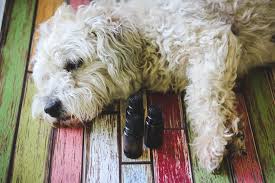 Siobhan Pestano is a Zoopharmacognosist based in London. This is someone who facilities zoopharmacognosy. A way to explain zoopharmacognosy is botanical self-healing.
Siobhan Pestano is a Zoopharmacognosist based in London. This is someone who facilities zoopharmacognosy. A way to explain zoopharmacognosy is botanical self-healing.
Zoopharmacognosy is a scientific term coined a few years ago when the behavior first started getting recognized. If you break it down into three parts: zoo (animal), pharma (medicine) and cognosy (knowing), it literally translates as "Animal Medicine Knowing," referring to animals' innate knowledge and ability to heal themselves using plants as they do in the wild.
Naturally, an animal in the wild is free to roam and forage and eat a little bit of this or that. They are able to address challenges as soon as they occur, whereas if someone has a dog, cat or even a horse in a field of full of grass rather than mixed herbs, they don't have the freedom to seek their own medicines. It doesn't serve an animal well to appear sickly or weak, so they tend to hide it from us. By the time we can look at our pet and see that they are ill, they've already been ill for a while.
As a zoopharmacognosist, Siobhan doesn't diagnose or treat animals, she enables the animals to self-select their own cures by offering pure, natural plant extracts in a safe and species-appropriate way.
Siobhan's kit includes dried herbs, powders, etc., but she states the most powerful part of her kit is single plant extract essential oils. These oils are very powerful and can do a lot medicinally simply through the animal's sense of smell and that they don't necessarily have to ingest them.
This is not aromatherapy. It may sound like it because aromas are involved and it is therapy, but it isn't inasmuch as if you went to an aroma therapist and had an aromatherapy massage or consultation. This is because you would tell them what the problem is and they would decide what's best for you according to their knowledge about plant extracts. While this does have its place and can be helpful, what zoopharmacognosy (or self-medication) does or provides is individualized medicine.
 Siobhan says, for example, she could have many things with anti-biotic or anti-bacterial properties on hand. If she offers eight of theses to an animal with an infection, it might select three or four of them. All animals won't select the same dosages, as they're not going to select the same types of remedies. It is the individualization of being able to select how much of what it is, and how they want it, and whether it is applied or inhaled. Surprisingly, she states, animals will show you what they want.
Siobhan says, for example, she could have many things with anti-biotic or anti-bacterial properties on hand. If she offers eight of theses to an animal with an infection, it might select three or four of them. All animals won't select the same dosages, as they're not going to select the same types of remedies. It is the individualization of being able to select how much of what it is, and how they want it, and whether it is applied or inhaled. Surprisingly, she states, animals will show you what they want.
The one example of this that most people can relate to is if they see their dog or cat eating grass. This is a form of self-medicating. Sometimes they do it to purge, but not always. The first reaction from most pet owners is they get their dog or cat away from it, because they think it will make them sick. This is a little bit anthropomorphic, because we think being sick is not good. However, the animals are thinking that they have something in their gut that they would like to get rid of. They believe if they eat the grass, they will be able to bring the contents of their gut back up and then feel so much better!
Siobhan states that this is all counter-intuitive to our culture of believing we know what's best for our animals and that sometimes we just need to listen to them.
Visit Website
Don't Litter - Spay or Neuter Instead! - Dr. Debbie
Spay Day is February 28, 2017.
 Do you believe your beautiful pedigreed pooch just has to be bred, or that your cat can't possible get outside to become pregnant, or that you long to have just one litter from Fluffy? If so, listen in to the unified pet health message of Spay Day. Shelter staff, veterinarians, and animal advocates all join together to encourage spaying and neutering. It's the right thing to do for your pet's health, and is a step forward in addressing pet overpopulation issues. With approximately 4 million dogs and cats euthanized at U.S. shelters every year, pet owners can do their part to avoid unintended and unnecessary breeding.
Do you believe your beautiful pedigreed pooch just has to be bred, or that your cat can't possible get outside to become pregnant, or that you long to have just one litter from Fluffy? If so, listen in to the unified pet health message of Spay Day. Shelter staff, veterinarians, and animal advocates all join together to encourage spaying and neutering. It's the right thing to do for your pet's health, and is a step forward in addressing pet overpopulation issues. With approximately 4 million dogs and cats euthanized at U.S. shelters every year, pet owners can do their part to avoid unintended and unnecessary breeding.
Your individual decisions on altering your pet do matter. Animals, left to do what they will, result in a lot of generations of whiskers and tails in just a short period of time. A pair of dogs can produce 67,000 puppies in 3 years' time. And cats in that same time frame can prosper to over 420,000 kittens.
Common Spay & Neuter Fallacies:
Isn't it better to let my female dog go into heat before I spay her?
FALSE. You can minimize the risk of breast cancer to zero by spaying before the first heat. Allow her to have a few heat cycles, and your dog has a 25% chance of developing breast cancer. The health benefits for females also include preventing uterine cancer and the life-threatening reproductive infection, pyometra.
Isn't it better to let a female dog have at least one litter of pups?
FALSE. There is no psychological or health benefit in allowing a female dog to have a litter. It does not make her a better, more affectionate pet. On the contrary, some pregnant female dogs are quite protective and aggressive to anyone disturbing her brood.
My dog is a purebred dog with a pedigree so it is meant to be bred.
FALSE. Having purebred papers doesn't mean an animal has to be bred. There is no shortage of purebred animals, with purebred dogs accounting for 30% of all animals currently in shelters.
 It's a great experience to allow children witness the beauty of birth by letting your pet have a litter.
It's a great experience to allow children witness the beauty of birth by letting your pet have a litter.
STOP. What really is beautiful is to impart children with a sense of value toward animal life. Yes, birth is a miracle to behold. But there are many books and videos that demonstrate birth in a responsible manner, without unnecessary pet breeding.
Teach your children to care for your existing pets, from puppyhood or kitten hood until senior pet years. Children learn responsibility while caring for a pet and develop an appreciation for the human-animal bond by living it daily.
Won't spaying or neutering my pet make my pet fat?
FALSE. You directly control what, when and how much your pet eats. The fate of your pet's waistline lies in your hands. Your pet's metabolism may slow down some after spaying or neutering, but with sensible feeding and regular exercise you can maintain a healthy weight for your pet.
It's expensive to spay or neuter my pet.
FALSE. There are many affordable solutions to ensuring your pet is spayed or neutered. Some veterinary hospitals and shelters offer special programs on Spay Day. And other facilities offer year round low-cost options.
Still not convinced spaying & neutering is worth it? Consider that the cost of spay or neuter is less than the cost of raising kittens or pups for a year. And don't ignore the possible realities of pregnancy problems. An emergency C-section for a pet having labor difficulties costs $1000 or more.
I want my dog to guard the house. Won't spaying or neutering make my pet less protective?
FALSE. There is no relation between your pet having reproductive organs and performing as a guard dog. A dog's protective behavior is based on instinct and training. Surgically spaying or neutering doesn't change your pet's devotion to protect home and family members. And once a dog is spayed or neutered, it has less desire to roam away from home to find a mate.
Take action now.
Of course you want to do what's best for your pet. Life is busy with family demands, work and a stream of errands. But don't delay this important step to keep your pet healthy for a lifetime together with you.
For more information on Spay Day visit the Humane Society.
For spay and neuter specials for dogs, cats, rabbits and potbelly pigs in Las Vegas, call Lone Mountain Animal Hospital at 702-645-3116 or visit the clinic.
Featured veterinarian known as "Dr. Debbie" on national pet radio program, Animal Radio. Ebook author of "Yorkshire Terriers: How to Be Your Dog's Best Friend"; "Pugs: How to Be Your Dog's Best Friend"; "Mini Schnauzers: How to Be Your Dog's Best Friend"; and "Shih Tzu: How to Be Your Dog's Best Friend."
Visit Website
Animal Radio News - Lori Brooks
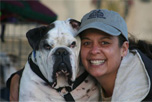 Fate of Steer Who Escaped Slaughterhouse Still Up In The Air
Fate of Steer Who Escaped Slaughterhouse Still Up In The Air
The ultimate fate of a steer who escaped from a slaughter house earlier this month is still up in the air, although one rescue group says Baby Huey, as they call him, may be kept by the owners of the slaughter house as a family pet. The Rowdy Girl Sanctuary Farm in Angleton, Texas, has informed the family that if they decide they don't want the steer anymore, to contact them so they can make other arrangements that would allow Baby Huey to live out his life without fear of being sent back to a slaughter house.
 Dogs Prefer Reggae Over Heavy Metal
Dogs Prefer Reggae Over Heavy Metal
When you leave the house, do you leave the TV or radio on for your pets? New research indicates that when it comes to music, dogs like variety. In a study conducted with the Scottish Society for the Prevention of Cruelty to Animals, researchers at the University of Glasgow played six-hour playlists from Spotify, consisting of five genres of music to shelter dogs. On one day, the dogs heard classical; on others they grooved to soft rock, reggae, pop and Motown. The researchers recorded the dogs' heart rate variability, their cortisol (or stress hormone) levels and behaviors like barking as they listened to the tunes, as well as on days when no music was played. Here's what they found. The dogs were generally "less stressed" when they heard music and they showed a slight preference for reggae and soft rock. What music did they like the least? Motown got the most paws down, but the range of responses to the genres was mixed. What they saw was that different dogs responded differently. Just like humans, everyone is different, so there might be a personal preference from some dogs for different types of music, just like in humans. Other research involving shelter dogs supports the chill factor of classical music and suggests they are also not fans of heavy metal, which leaves many dogs physically shaking. The results make a very strong case for music as a calming technique, especially in shelters where the high stress levels can cause dogs to cower, bark loudly, jump at people for attention and behave in ways that make them less likely to be adopted. The study, published in the journal Physiology and Behavior, was built on previous research by the same team that found shelter dogs hearing classical music bark less and lie down more, signs of relaxation, but the effect doesn't last forever. By the seventh day of classical music, the benefits to the dogs in that study had worn off showing that they get used to the music. That's why researchers tested different kinds of music. By the way, shelter dogs also appear to find audio books to be calming and soothing. As the search for what makes our pets happy continues, the next question for these researchers is to find what exactly dogs like or dislike in music, like are there particular instruments they find pleasant or specific tempos?
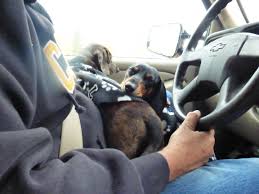 Bill Would Ban Pets in Laps While Driving
Bill Would Ban Pets in Laps While Driving
North Carolina State Lawmaker, Representative Garland Pierce, wants pet owners to show affection for their pets, but not while they are trying to drive a car. Pierce says, "I don't have a problem with pets, actually, I want people to love their pets. But I want the highways to be safer." Pierce is the primary sponsor of North Carolina House Bill 73, which was recently introduced. He says he introduced the bill because his constituents raised the issue. The people with whom he spoke said people driving with animals in their laps were at a higher risk of being involved in traffic accidents, because animals can be a distraction and reduce reaction time during a critical moment. It's not a law yet though. House Bill 73 is in committee now and if it's approved there, it will have to be put before the full chamber of state representatives for debate then voted on.
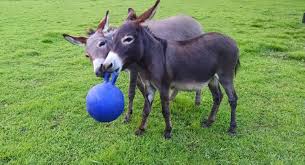 If You Want a Miniature Donkey - You Must Get Two
If You Want a Miniature Donkey - You Must Get Two
There's a new trend in the world of exotic pets, but not your typical exotic animal. We're talking about the increase in people who are adopting miniature donkeys. These miniature donkeys are pretty much about the same size as a large dog. Those who own, and even show, the miniature donkeys say they are very smart and really responsive to humans, kind of like a dog that just wants to be near you. One man who has 30 of the little donkeys says he's trained a lot of different breeds of dogs and young horses, but the donkeys are a lot more like training a dog than they are a horse. Still, like some dog breeds, house-training a miniature donkey is nearly impossible. The trainer says he's found that when they need to potty, they just do it. But, the bigger issue is that they are equine, which means they are herd animals. So you really need two, either two donkeys or a donkey and a horse, or they would become very lonely. One breeder of the miniature donkeys says she has turned down potential adopters that do NOT have at least one herd animal already in their home.
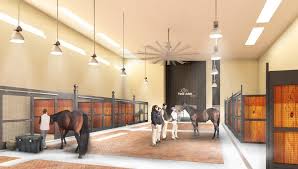 Animal Terminal Opens at JFK
Animal Terminal Opens at JFK
The world's first privately owned animal terminal and quarantine facility has opened at John F. Kennedy International Airport in New York. The ARK, as its known, is a huge $65 million dollar, 14 acre facility that is cozy enough for a tiny kitten but spacious enough for a Clydesdale. The ARK caters to travelers who send their animals as cargo but do not want them just hanging out unattended in the holding area before, or after, a trip. Companion animals stay at the Pet Oasis, which welcomes pets arriving, departing or in-between flights, for a fee starting at $125. Before takeoff, you can drop off your pet and they get it ready with a preflight walk and check the crate for airline compliance. The staff will then transport the pet to the plane and coordinate with the airline on the departure time to minimize the wait at the boarding area. For arrivals, the staff picks up the pet from the airplane and handles all of the customs requirements. Then, once at the Pet Oasis, pets get their food, a bath and brushing, plus potty breaks in a grassy area. Pet parents can also receive photo updates on their pet. If your furry friend is of a larger variety, the ARK also has a dedicated area for horses and those who travel with them, like their jockeys and grooms. There's also a specialized habitat for birds of all kinds. A vet clinic is also in the works, as is Paradise 4 Paws, a luxury pet resort that already operates near airports in Chicago, Denver and Dallas/Fort Worth.
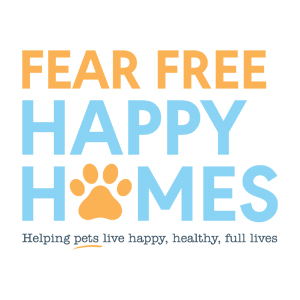
NEWS UPDATE brought to you by Fear Free. "Take the 'pet' out of 'petrified'" and get pets back for veterinary visits by promoting considerate approach and gentle control techniques used in calming environments.
 Listen to the entire Podcast of this show (#899)
Listen to the entire Podcast of this show (#899)





